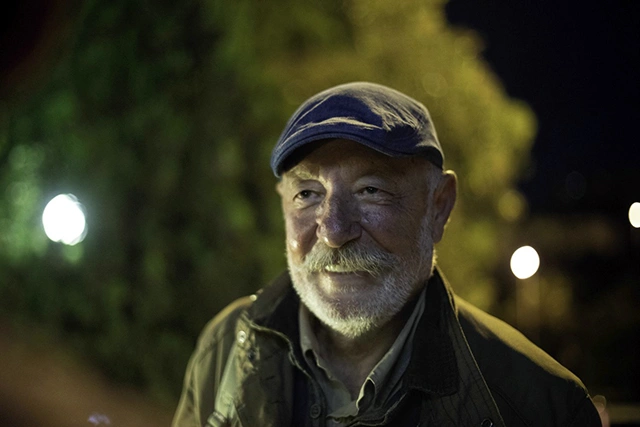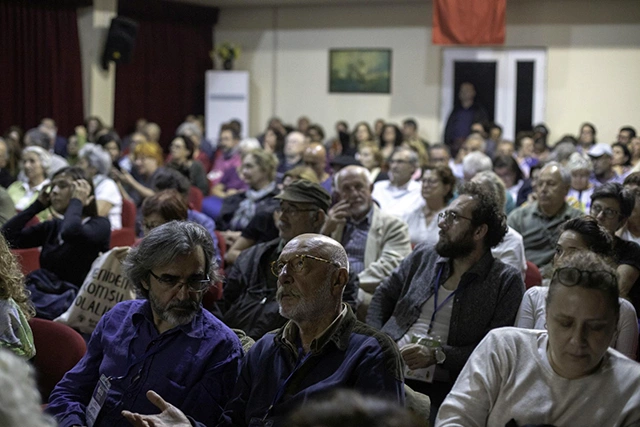
Dear Naci,
This my first letter to you. I have decided to write to you instead of writing about you. There’s so much to tell… Today, it has been exactly one month since we learned that we wouldn’t hear your sweet voice ever again. I invited you to my father’s speech about John Berger in Ayvalık. “Dear Leylâ give me a couple of days to make my mind up.” you said. When I told you we were going to Assos, you said, “I’ll see you then. I’ll be staying at Karlos’ on Friday & Saturday.” We were either going to visit you on Saturday afternoon or you were going to return to Tavaklı after having a Sunday coffee at our place. It wasn’t meant to be.
You were not sure about attending BIFED this year, but I told Petra that I’d go. Who could have known that amazing lunch in Ethem’s garden was our “last supper”? When I took pictures with you in them, I would send a copy of them to you as well. I got some pictures from that table, somehow, I didn’t send them to you. You are in two of them. One with you slouched in a chair and listening to people with a cigarette in your mouth that you haven’t lit yet, Dunhill of course. And in the other picture, you are lighting your cigarette, with your watch capturing the time, you are wearing sunglasses, a green cap and a grey Lacoste T-shirt. In front of you, there is an empty, blue-rimmed plate: We have eaten the saddled seabreams Ethem caught and cooked. And your glass is about to be refilled with: Ayapetro Early Harvest Vasilaki, Bozcaada 2022. On your left, Petra smiles at the camera. The 6th of August 2023. It’s 13 to 2 pm.
When I went back to Ayvalık, I was commissioned to write an article about olives. I missed writing so much that I accepted the offer without hesitation. The article was due the 1st of October. As I was spending my days thinking about what to write, I got a message from Petra, saying they had decided to present the award in the category of Gaia Student Documentary Competition as “Naci Güçhan Award” and asking if I would be willing to write a text about “Naci Hoca”. I said, “I can try.” Three days later, Lament of Olives was born.
“Olive green frames are flashing before my eyes. From Bozcaada, Adatepe, Değirmen, Tavaklı… First arrivals, last departures. An olive falls from the sky onto the billiard table. Lacrimosa…” This is how I ended my work. It was Nihat who took me to Bozcaada for the first time. I don’t know if I told you about this: Nihat was in love with the bicycle scene from Butch Cassidy and the Sundance Kid. In Büyükada, he took me on his bike and took me around just like in that scene. In Turkey, the movie was in theaters with the title “Sonsuz Ölüm” which translates as eternal death.
Don’t be mad, but I just saw Hope. After you reproached the server in Troas just because they didn’t know Yılmaz Güney’s Hope although their name was Umut (hope), I found the movie and watched it as soon as I was back in Ayvalık. I was secretly happy that I watched it after I had lived in Adana for some time. Just then, while I was walking around in the market, I met a guy’s eyes from the shop on the corner of the At Arabacılar Square that leads to the beach. He was shouting, “Bah hele, bah hele.” I asked him, “Are you from Adana?” “No,” he replied, “My wife’s friend says it, and I just like it.” Overenthusiastically, I said, “I just watched Yılmaz Güney’s Hope!” Since then, we smile at each other every time I pass by.

You were a jury member in the 6th BIFED. The tenth of the interviews with the directors and jury members of the festival was made with you. Mustafa Dermanlı says, “We talked about cinema in Turkey, ecology and BIFED.” The topics of the conversation ranged from ecology to art, to poetry. You also said you were very hopeful about Turkey’s cinema. You started talking about T.S. Eliot’s essay Tradition and the Individual Talent (1919) which you saw as your “starting point”. You argued that as the tradition became richer, the number of quality films and directors increased. You also said, “It may sound a bit cliché, but I’m very hopeful.” WHAT CLICHÉ ARE YOU TALKING ABOUT, NACİ?! You have the virtue of being hopeful. It’s you who could explain you the best. I could read that interview over and over again. I’m sure those who read this letter would like to read it as well*. Who knows how many more times we will watch the conversation “A Century of Our Cinema” that you had with Turgay at TESAK. I can’t help wishing I was your student.
I couldn’t get enough of the stories you told us, no matter how many times we heard them. You never got tired of telling them, and we never got tired of listening to them. One day, you phoned me and said, “Dear Leylâ, I owe you.” I was surprised. What could you possibly owe me? “You recommended me a really good novel, and thanks to you, I read Emanet Zaman (Entrusted Time),” you said, “now, it’s my turn to recommend you a book. An interesting book that you can read in different moods: Kırmızı Kazak (The Red Sweater).” And there were also these cookbooks that we bought without each other’s knowledge. When you told my mom that you added cinnamon to the cranberry bean dish, I thought to myself that you may have got it from Marianna Yerasimos’ recipes. Sofranız Şen Olsun (May Your Table Be Joyful) was another favorite of ours. It cannot a coincidence that we met at Sevim’s marzipan shop, Bebek Badem Ezmesi.
Let me tell you a little bit about Ömer. He didn’t know how to tell İdil. She said, “I want to see Grandpa Naci.” Ömer remembered how close children felt to the nature. Then, he remembered Wordsworth’s famous ode. Immortality, associations of childhood memories… And he said, “Grandpa will be a flower, a tree. I buried him in the soil.” İdil asked, “Did you cover him well?” We often text each other. You told him, “You should definitely see Drive My Car.” “It’s a great movie,” he says, “I’m re-reading Uncle Vanya because of it.” After he got the grim news, he watched Citizen Kane on the plane. You always ranked it in your top four. It was just this summer when you and I talked about Xanadu. You said it was “the castle in Citizen Kane“, and I said “Kubla Khan’s summer palace in Coleridge’s poem”. The legend has it that a woman told Kubla Khan the name of the palace in his dream. You, too, loved dreams. Especially Bir İlkyaz Düşü (A Spring Dream):
You’d come with June poppies every summer,
I’d wait for you leaning against the windowsill,
for you to come, flying through the poppies,
as if competing with butterflies.
Yet I watched the snow falling all winter, from the same window,
the silent sea that forgot the blue of the sky under the snow.
I saw the lights of houses far from the shore in the night,
the glowing eyes of hungry wolves coming down from the mountains.
Before you come, I’ll write the names of the herbs my mom collected
in this notebook to teach you,
the reason why the weeping willows are called so,
that in foreign lands, they didn’t even know
the pomegranate cries, the quince smiles.
When you come, I’ll show you the hills rising from the seashore
olive groves and suns
hidden in the olives. In the evenings
when we sit facing the sea, we’ll tell each other
about the old gardens where Sappho used to sing.
And when everyone is starting to forget
we’ll try to revive the colors of those old gardens.
Leylâ Çapan
Translation: İpek Yardımcı